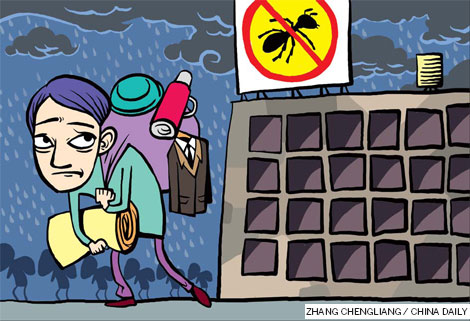Pulse
Kicking 'ants' out won't help them
By Fred Yang (China Daily)
Updated: 2011-03-29 07:59
 |
Large Medium Small |

Efforts to wipe out capsule living will not solve problem for low-income renters
"I've got a 22-square-meter room for 600 yuan a month - and it's near the subway station!!!" read my friend's text message. He was keen to share the good news that he'd found a cheap apartment and I think his excitement was entirely summed up by the three exclamation marks.
So, some days later, I went over to his new place for a house warming party. As soon as he opened the door I sensed something was odd - the layout of his new home was a little confusing - but the feeling soon dissipated once we got to his room. It's spacious and well equipped, and even has a balcony. The going rate of a room like this in that neighborhood is at least twice as much as he's paying.
Just as I was wondering how he struck such a bargain, loud voices from a television show burst into the room. The walls play no part in absorbing sound, much less preventing it. That was when I realized his room is part of a larger living room, separated with just thin paperboards.
It immediately made me think of those miserable folk who can only afford to rent a bed or live in one of those so-called cubicle apartments, cramped partitioned spaces. In extreme cases reported by the media, one living room can be remodeled into four or five rooms, so as to maximize the landlord's profit.
The outcome is that individual costs are brought down while the problems mount up. With the extra number of tenants comes a strain on communal resources, such as excessive use of the elevator, as well as an increased risk of theft and unduly large amounts of trash and noise. All of these consequently disrupt the lives of others.
No wonder policymakers issued regulations prohibiting property owners from making structural changes to house more tenants. However, out of curiosity, where are those cohabitants supposed to live instead? I didn't hear of any alternative programs for things like low-rent housing for those likely to be out on their ears.
Does the policy really switch them from the frying pan and into the fire again? Does this mean these tenants are going to end up paying much higher costs for better rooms?
Shanghai issued similar regulations back in 2007, and by the looks of things they didn't go down too well. Apparently, clearing up the chaos is far from easy. The cheap prices are extremely tempting, especially compared to the rocketing mainstream rental prices, and are luring countless low-income workers.
A white-collar worker called Xu recently caused a sensation by posting an online request to sleep over in other people's apartments. He had given up his 5,000-yuan-a-month apartment after the real estate agency announced it would increase his rent by 30 percent.
Xu was lucky. He got a flurry of cordial invitations from netizens, enough for him to get through a whole Spring Festival. Even with resorting to such tactics though, the fact he can cover a rent of 5,000 yuan leaves him with a much wider range of options to find a decent alternative. As for those who can only scrape up enough for a capsule-sized space, until they finally accomplish their "Beijing dreams" or get a windfall to upgrade their housing situation, I guess all they can do is cross their fingers and hope their dingy shelters won't be found.
Of course, I'm not saying the regulation is wrong, but it surely needs improving in many ways, such as reining in the rising rental prices and increasing tax on the profits spun from the newly created rooms. If profiteers or homeowners see no considerable profits from revamping their properties, perhaps the capsule living phenomenon will end on its own.
However, simply proscribing the hazardous living situation is not entirely in the interest of these "ant house sharers". It does little more than chase them out to more risky and covert places, or even to the streets.
After all, it's not exactly humane to render people homeless just for the sake of safety.
The author works at Chinadaily.com.cn. To comment, e-mail metrobeijing@chinadaily.com.cn. The views expressed here do not necessarily reflect those of METRO.
| 分享按钮 |